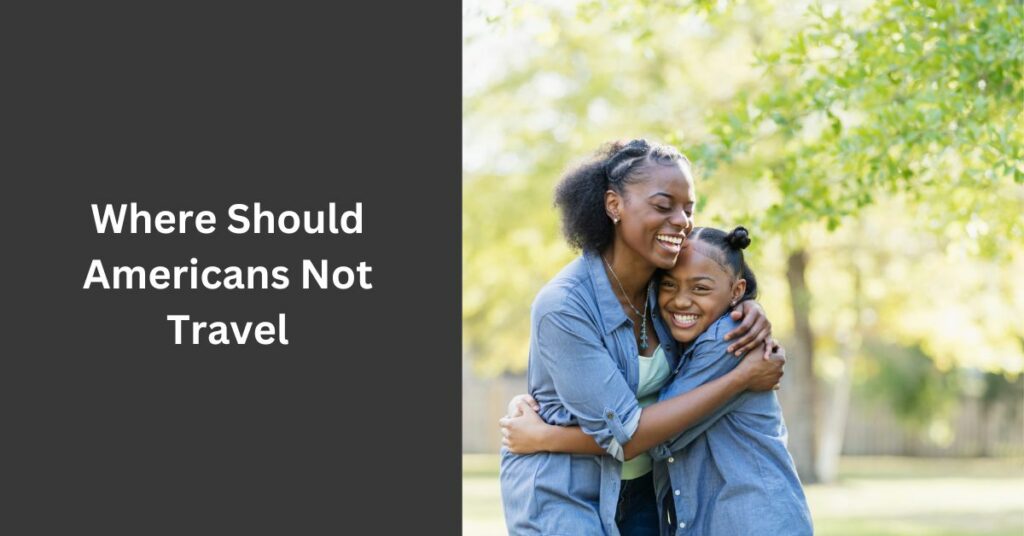As an American, I value my freedom to travel anywhere in the world. However, there are certain destinations that require extra caution and research before embarking on a trip. With increasing global conflicts, natural disasters, health risks, and political unrest, it is important to be aware of where Americans should not travel.
Understanding travel warnings and advisories is essential for safe international travel. The U.S. Department of State issues travel advisories for countries with ongoing conflicts or high crime rates. These advisories provide information on potential dangers and recommended precautions for travelers.
Additionally, it is important to consider natural disaster-prone areas and take necessary steps to prepare for emergencies while traveling. By being informed about these factors and taking necessary precautions, we can still enjoy the freedom of exploring different parts of the world while staying safe.
Understanding Travel Warnings and Advisories
You’ll want to check out travel warnings and advisories to stay informed before your trip. Understanding travel warnings and advisories is crucial in making informed decisions about where to go and what precautions to take while traveling.
The U.S. Department of State issues travel advisories for countries based on risk assessment and analysis of security threats, natural disasters, civil unrest, health concerns, and other factors that may affect travelers. Travel advisories also include information on travel restrictions such as entry or exit requirements, visa regulations, quarantine rules, curfews, checkpoints, roadblocks, and other measures that may impact your itinerary. These advisories are updated regularly based on changing conditions in a country or region.
It’s important to note that a Level 4 ‘Do Not Travel’ advisory does not necessarily mean that Americans are banned from traveling to a particular destination; however, it indicates the highest level of risk due to safety and security concerns.
By understanding travel warnings and advisories, you can make informed decisions about where you should not travel given the current situation in a particular country or region. This information can help you avoid potential dangers such as crime, terrorism, kidnapping, civil unrest or disease outbreaks.
In the next section, we’ll focus on countries with ongoing conflicts, which pose significant risks for American travelers who choose to ignore these warnings.
Countries with Ongoing Conflicts
It’s best to steer clear of countries where conflicts are still raging if you don’t want to risk getting caught in the crossfire. As someone who values safety and security while traveling, I always check for travel advisories before booking a trip.
Unfortunately, there are several nations that have been plagued by humanitarian crises and ongoing wars, making them dangerous destinations for tourists. Here are some war-torn nations that should be avoided:
- Syria: The Syrian civil war has been ongoing since 2011 and has resulted in widespread destruction, displacement of millions of people, and thousands of deaths.
- Yemen: A proxy war between Saudi Arabia and Iran has led to a devastating humanitarian crisis in Yemen. Millions of people face famine, disease outbreaks, and lack access to basic necessities like clean water.
- Afghanistan: Decades of conflict have left Afghanistan one of the most unstable countries in the world. Ongoing terrorist attacks make it an extremely dangerous destination for travelers.
Visiting these countries not only puts your own safety at risk but also contributes to the perpetuation of violent conflicts. It’s important to take responsibility as a traveler and avoid supporting regimes that contribute to human suffering.
While exploring new destinations can be exciting, it’s crucial to prioritize our safety when planning our travels.
In the next section, we’ll discuss high crime rate destinations where caution is equally important in ensuring a safe trip.
High Crime Rate Destinations
Traveling to destinations with high crime rates requires extra caution and preparation. It’s important to research the areas you plan to visit and understand the risks involved.
Tourist scams are a common problem in many high crime rate destinations, so it’s essential to be aware of potential dangers before arriving. Pickpocketing hotspots are also prevalent in these areas, making it crucial to keep your personal belongings close at all times.
Some popular tourist destinations with high crime rates include Rio de Janeiro, Brazil and Johannesburg, South Africa. In Rio de Janeiro, it’s recommended that tourists avoid certain neighborhoods such as Rocinha and Complexo do Alemão due to their reputation for violence and drug trafficking. Johannesburg has one of the highest murder rates in the world, so visitors should exercise extreme caution when exploring the city.
If you do choose to travel to a destination with a high crime rate, there are several precautions you can take. Avoid wearing flashy jewelry or carrying large amounts of cash. Keep your passport locked up in a hotel safe and only carry a copy with you while sightseeing. It’s also wise to familiarize yourself with local emergency numbers before arrival.
While traveling can be an exciting adventure, it’s essential always to prioritize safety first. By researching potential dangers beforehand and taking necessary precautions, you can still enjoy all that these destinations have to offer without putting yourself at unnecessary risk.
Next, we’ll explore natural disaster-prone areas and what steps travelers can take when visiting them.
Natural Disaster-Prone Areas
If you’re planning to visit natural disaster-prone areas, be aware that these regions may experience frequent earthquakes, floods, or hurricanes. While experiencing the fury of nature can be awe-inspiring, it’s important to prioritize safety.
It’s easy to get caught up in the excitement of visiting a new place and forget about potential dangers. One way to prevent disasters is by being informed about the region’s history of natural disasters.
For example, if you plan on visiting an area prone to hurricanes during hurricane season, make sure you know what evacuation procedures are in place and where local shelters are located. Additionally, it’s smart to purchase travel insurance that covers trip cancellations and interruptions due to natural disasters.
In some cases, avoiding natural disaster-prone areas altogether might be the best option. Remember that your safety should always come first when traveling.
In our next section, we’ll discuss how political unrest in certain regions can also pose a threat to travelers seeking adventure abroad.
Political Unrest in Certain Regions
You’ll want to stay informed about political unrest in certain regions, as it can impact your travel plans and safety. Protests and demonstrations are common occurrences in many parts of the world, particularly in countries with government instability. While these events may seem like a distant problem, they can quickly escalate into situations that threaten the safety of travelers.
To avoid being caught off guard by political unrest during your travels, it’s important to do your research before you go. Start by checking the latest news and updates on the region you plan to visit. Look for any indications of potential political instability or upcoming protests. You should also consider consulting with travel experts or local authorities for additional guidance.
In some cases, it may be best to avoid traveling altogether if there is a high risk of political unrest in a particular region. If you must travel to an unstable area, take extra precautions such as staying away from large crowds and keeping a low profile. Remember that personal safety should always be your top priority when traveling abroad.
With careful planning and preparation, you can minimize the risks associated with political instability and enjoy a safe trip abroad.
Moving on to health and disease risks…
Health and Disease Risks
Staying healthy while abroad can be a tricky game of dodgeball, with disease risks lurking around every corner. Vector-borne risks are especially prevalent in certain areas, where mosquito and tick populations are high.
Malaria, Zika virus, dengue fever, and chikungunya are just some of the diseases that travelers should be aware of when visiting tropical countries or regions with high humidity.
Food and water safety is another major concern when traveling abroad. Consuming contaminated food or water can lead to illnesses such as traveler’s diarrhea, typhoid fever, and hepatitis A. It’s important to research the food and beverage options available at your destination beforehand in order to minimize the risk of contracting a foodborne illness. Additionally, it’s recommended that travelers avoid consuming tap water and opt for bottled water instead.
When traveling internationally, it’s crucial to prioritize personal health by taking preventative measures against vector-borne diseases and practicing safe food and water habits. By doing so, you can enjoy your trip without compromising your well-being.
However, there are also cultural considerations that must be taken into account in order to fully immerse oneself in local customs and traditions.
Cultural Considerations
As a traveler, I’m always conscious of the cultural norms and customs of the places I visit. When it comes to LGBTQ+ rights and acceptance, it’s important to research ahead of time to ensure that your chosen destination is safe and welcoming.
Additionally, understanding religious and social customs can help you avoid offending locals. Taking the time to learn some basic phrases in their language can go a long way towards building positive connections with people from different backgrounds.
LGBTQ+ Rights and Acceptance
If you’re a member of the LGBTQ+ community, it’s important to research the level of acceptance and legal protections in any foreign country before making travel plans.
Here are three factors to consider when evaluating LGBTQ+ rights and acceptance in a potential travel destination:
-
Legal status: Make sure to research whether same-sex relationships are legal or recognized in the country you’re visiting. Some countries may have laws criminalizing homosexuality or limiting LGBTQ+ rights.
-
Discrimination: Look into if there are any anti-discrimination laws protecting LGBTQ+ individuals in areas such as employment, housing, and public accommodations.
-
Social attitudes: Consider the general attitude towards the LGBTQ+ community in the country you’re visiting. Are there visible signs of support, such as pride events or openly queer public figures? Or is there a prevalent culture of homophobia that could put your safety at risk?
It’s crucial for members of the LGBTQ+ community to be aware of these factors when traveling abroad to ensure their safety and well-being. Understanding local laws and social customs can help make for a more enjoyable experience while exploring new cultures.
When considering cultural considerations during travel, another important factor to keep in mind is religious and social customs.
Religious and Social Customs
As an LGBTQ+ person, it’s important for me to research the social and legal landscape of any country before I travel there. But even if a place has progressive laws on paper, the cultural attitudes towards queer people might not be so welcoming. This is especially true in countries where religion plays a big role in society. Being sensitive to religious customs can be a challenge when you’re traveling, but it’s important to try your best out of respect for local communities.
Religious and social customs can vary wildly from country to country. This can include everything from religious dress codes and dietary restrictions to gender roles and social etiquette. It’s important to do your research ahead of time so that you don’t accidentally offend someone or break any taboos.
For example, some cultures have strict rules about alcohol consumption or traditional practices around gift-giving. By being aware of these cultural norms, you’ll be able to navigate new environments with greater ease and sensitivity.
When traveling abroad, language barriers can also pose a challenge. In my experience, it’s always helpful to learn a few key phrases in the local language before arriving in a new place. Not only does this show respect for the culture you’re visiting, but it also makes communication much easier if you find yourself lost or needing help.
Language and Communication
Learning the local language and communication customs can make a huge difference in connecting with people and experiencing the culture authentically. However, language barriers and cultural differences may pose some challenges when traveling to certain parts of the world.
It’s important to be aware of these differences before your trip so that you can prepare accordingly. For example, in some countries, it’s considered rude to speak loudly or directly point at someone with your finger. In other places, using hand gestures or body language may be more common than verbal communication.
Additionally, understanding basic phrases such as ‘hello,’ ‘please,’ and ‘thank you’ can go a long way in showing respect for the local customs and making a good impression on locals. By taking the time to learn about these cultural nuances before your trip, you’ll be better equipped to navigate any language barriers or cultural differences that may arise during your travels.
As I prepare for my next adventure abroad, I’m also mindful of the importance of travel insurance and preparedness. While learning about different cultures is an exciting part of travel, it’s also important to be aware of potential risks and take steps to protect myself while abroad.
Travel Insurance and Preparedness
I can’t stress enough the importance of travel insurance when going on a trip. It provides peace of mind and financial protection in case of unforeseen circumstances such as medical emergencies or trip cancellations.
Along with travel insurance, emergency preparedness and planning are also crucial to ensure a safe and smooth journey. This includes researching the destination’s safety measures, packing essential items such as first aid kits, and informing loved ones about your itinerary.
Remember that staying safe while traveling is a top priority, so take every necessary precaution to make sure you have an enjoyable and hassle-free experience.
Importance of Travel Insurance
Don’t forget to grab travel insurance before your adventure, it can save you a lot of stress and money in case of unexpected mishaps. Travel insurance provides various benefits such as medical coverage, trip cancellation protection, and emergency evacuation.
It may seem like an added expense, but the cost effectiveness is undeniable when compared to the potential costs of unforeseen emergencies. Medical coverage alone can be extremely expensive when traveling abroad, especially if you require hospitalization or medical transportation.
Trip cancellation protection ensures that you don’t lose all your money if something unexpected comes up and forces you to cancel your trip. Emergency evacuation is also crucial in case of natural disasters or political unrest in the country you are visiting.
In short, travel insurance provides peace of mind for any traveler. Moving onto emergency preparedness and planning…
Emergency Preparedness and Planning
Ready to hit the road? Before you do, make sure you’ve got your ducks in a row and have planned for any potential emergencies that could rain on your parade.
Creating an emergency kit is crucial when traveling, especially if you’re going to areas prone to natural disasters or political unrest. Make sure your kit includes essential items such as first-aid supplies, water, non-perishable food, and a flashlight.
Another important aspect of emergency preparedness is having an evacuation plan in place. Familiarize yourself with the nearest embassy or consulate and have their contact information readily available. Communication devices such as a satellite phone or radio can also be helpful in case of an emergency where regular communication methods are unavailable. And don’t forget about backup power sources for those devices!
Being proactive in emergency planning can save you from unnecessary stress and danger while traveling.
As important as it is to prepare for emergencies while traveling, it’s equally important to stay safe while on the road.
Staying Safe While Traveling
Stay safe while exploring new destinations by taking necessary precautions and being aware of potential dangers. One common danger that travelers face is falling victim to travel scams. These can range from fake tour guides charging exorbitant fees to pickpockets targeting unsuspecting tourists.
To avoid these scams, do your research before traveling and only use reputable tour companies and transportation services. Additionally, keep an eye on your belongings at all times and don’t carry large amounts of cash or valuables with you.
Another important consideration for staying safe while traveling is navigating local transportation systems. It’s important to be aware of the different modes of transportation available in each destination and understand how they work. For example, in some cities, it may be safer to use public transportation instead of hailing a taxi on the street.
Always keep track of schedules and routes so you don’t end up lost or stranded in an unfamiliar area. With a little bit of planning, you can ensure that your travels are both enjoyable and safe.
Frequently Asked Questions
How do I find out if a destination is safe to travel to?
Isn’t it ironic that in a world where we have the freedom to travel anywhere, we also have to constantly worry about our safety when doing so?
But fear not, fellow wanderers, for there are plenty of research resources available to help us make informed decisions about our travels. One such resource is the travel advisories issued by governments and other organizations.
These advisories provide up-to-date information on potential risks and dangers in various destinations around the world. It’s important to thoroughly research your destination before booking your trip and regularly check for any updates or changes to travel advisories.
By taking these precautions and staying informed, we can continue to explore this beautiful world with peace of mind.
What are some common scams or dangers to watch out for when traveling to high crime rate destinations?
When traveling to high crime rate destinations, it’s important to be aware of common scams and dangers. One of the most prevalent scams is pickpocketing, where thieves will distract you while another person steals your wallet or purse.
Another danger to watch out for is theft from cars or hotel rooms, so always keep your valuables locked up and out of sight. It’s also important to take safety measures such as not carrying too much cash on you at once and avoiding unlit areas at night.
Taking precautions like these can help ensure a safe trip, even in dangerous destinations.
What should I do if a natural disaster occurs while I am traveling in a prone area?
As a traveler, it’s important to be prepared for any unexpected emergencies that may occur while abroad. Natural disasters can strike at any moment, and being equipped with emergency protocols and evacuation plans is crucial.
It’s also important to have communication strategies in place, such as knowing how to reach local resources like emergency services or the embassy. In the event of an earthquake, hurricane, or other natural disaster, staying calm and following established procedures can make all the difference.
While we all hope for smooth travels without incident, it’s better to be safe than sorry when it comes to potential disasters. Remember: always do your research beforehand and stay informed throughout your trip.
How can I stay informed about political unrest in certain regions before and during my travels?
When planning travels, it’s important to stay informed about political unrest in certain regions. I make sure to check travel advisory updates and reliable news sources before and during my trips.
It’s also helpful to consult with local contacts and embassy resources for a more accurate understanding of the situation on the ground. While it can be tempting to avoid destinations experiencing unrest altogether, I believe that knowledge is power – being aware of potential risks allows me to make an informed decision about whether or not to proceed with my travel plans.
So while it’s always important to prioritize safety, I won’t let fear stop me from exploring new places and experiencing different cultures.
Is it necessary to get specific vaccinations or take other health precautions when traveling to certain destinations?
Did you know that over 1.5 million people die each year from vaccine-preventable diseases? This statistic highlights the importance of vaccination requirements and other health precautions when traveling internationally.
Before embarking on your trip, it’s crucial to research the specific vaccines required for your destination and any potential health risks. Additionally, purchasing travel insurance can provide peace of mind in case of unexpected medical emergencies while abroad.
Taking these precautions not only protects yourself but also those around you by preventing the spread of contagious illnesses. So don’t let fear stop you from exploring new places – with proper preparation, you can safely enjoy all the world has to offer.
Conclusion
Well, that was quite an eye-opener. After researching and writing about the places where Americans shouldn’t travel, I feel like I need a stiff drink and a long nap.
The world’s full of danger, it seems, but with proper preparation and planning, one can minimize the risks. From war-torn countries to destinations with high crime rates or natural disaster-prone areas, there are many places we should avoid.
However, just because a place has been deemed unsafe doesn’t mean we shouldn’t go at all costs. It’s all about weighing the risks versus the rewards and making informed decisions.
Overall, traveling is an enriching experience that allows us to learn more about other cultures and ourselves. While there are certainly places we should avoid due to safety concerns or cultural differences, let’s not let fear stop us from exploring this beautiful planet.
As they say, life begins at the end of your comfort zone.

Meet Audrey and Carl Thompson. This dynamic married couple not only shares a passion for each other but also a deep love for exploring the world. Through their captivating writing, Audrey and Carl offer a unique perspective on traveling as a couple. They delve into their personal experiences, shedding light on the challenges and joys of navigating the globe hand in hand. Their insightful articles address the questions and concerns many travelers face, helping you forge a stronger bond with your partner on your own incredible adventures.



